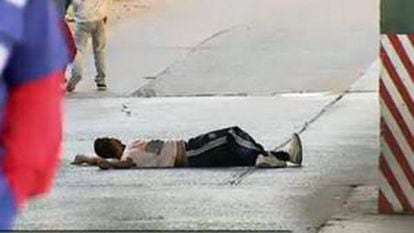Argentina’s president planning proposal to regulate street protests
Demonstrators throw man off bridge after he tries to get through a roadblock


In Argentina, it is easy for a small group of demonstrators to cut off any major road or thoroughfare – only about a dozen people are needed.
On some occasions, security officials try to break up the roadblocks but usually the law is on the side of the protestor. Motorists in Argentina have grown accustomed to the traffic jams caused by these protests, but sometimes someone does try to force their way through, risking injuries for those on the street.
And sometimes these incidents end in shocking tragedies, like the one that took place on Wednesday when 27-year-old Raúl Lezcano tried to drive his motorcycle through a group of protestors who had cut off the Avellaneda Bridge in Buenos Aires. He was taking his wife, who was four months pregnant, to the hospital and tried to explain his emergency to the protestors from the Argentinean United Ports Union (SUPA) who had cut off traffic.
SUPA officials reportedly beat him up and threw him off the bridge, leaving him unconscious and his orthopedic leg completely destroyed, his family said.
“They took everything he had: his jacket, money, cellphone… they even wanted to pull down his pants to take his orthopedic leg. How far will they go to humiliate a person?” asked his uncle Walter.
Hours later, SUPA secretary general Juan Corvalán announced his resignation. “I don’t want to have anything to do with this. I do not want to set up any more roadblocks,” he said.
We are going to need some type of rules to guarantee co-existence”
The incident comes little more than a month after President Cristina Fernández de Kirchner announced that she would push for national legislation to regulate street protests and blockings. Her proposal surprised many because it was a complete turnaround from the position taken by her late husband, President Néstor Kirchner, who in 2006 said he was against sanctioning protestors because “we have already seen [during the dictatorship] what happens when one Argentinean lifts a hand against another.”
But speaking before lawmakers on February 1, Fernández de Kirchner said that it “was unacceptable that 10 people can cut off a street and nothing happens. We are going to need some type of regulation to guarantee co-existence,” she said.
In 2010, there were some 340 roadblocks in Buenos Aires and last year that number reached 677, according to city figures.
Juliana Di Tullio, the head of the president’s ruling bloc in Congress, said that some people may have misinterpreted Fernández de Kirchner’s comments because the government has no plans to suppress any type of protest. “As long as we are in government, protests will not be quashed; you have never seen us doing it and you will never see it,” Di Tullio said.
Nevertheless, she acknowledged that the president had asked lawmakers to draft legislation that would regulate street demonstrations.
“I believe that everyone has the right to protest but not block off streets and prevent people from going to work,” Fernández de Kirchner said. “I think we are going to have to introduce rules of respect and urban co-existence, which allow everyone to protest.”
Guillermo Dietrich, the transportation secretary in Buenos Aires, which is governed by the conservative PRO opposition, said he believes that Kirchner and Fernández both tolerated the street protests at one time because they were able to politically capitalize on them.
“But society has now got caught up in that vicious cycle where no one respects anyone anymore, and people are resigned to that fact and have accepted roadblocks as part of life,” he said.
Last December, when power outages affected the entire capital in the middle of a summer heatwave, hundreds of thousands of Buenos Aires residents took to the streets to block roads, Dietrich explained.
“The national government was responsible for not taking the necessary precautions," he said. "But there were also residents who blocked railroad traffic and their frustrations were legitimate. But is there any justification to put in jeopardy about 200,000 other people who had no way of getting home that day?
“When you visit other countries in the region, such as Chile or Uruguay, you can see we have lost a lot when it comes to co-existing with one another.”










































